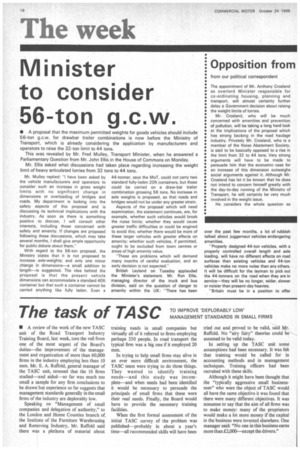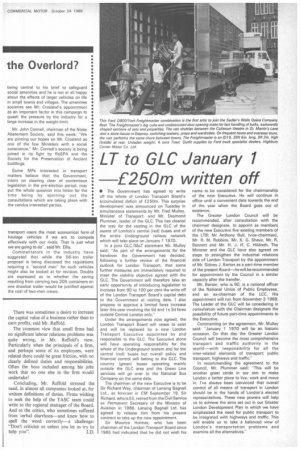The task of TASC
Page 20

Page 21

If you've noticed an error in this article please click here to report it so we can fix it.
TO IMPROVE 'DEPLORABLY LOW' MANAGEMENT STANDARDS IN SMALL FIRMS
• A review of the work of the new TASC unit of the Road Transport Industry Training Board, last week, tore the veil from one of the most urgent of the Board's duties—the improvement of the management and organization of more than 60,000 firms in the industry employing less than 10 men. Mr. E. A. Reffold, general manager of the TASC unit, stressed that the 16 firms studied—and aided—so far was much too small a sample for any firm conclusions to be drawn but experience so far suggests that management standards generally in the small firms of the industry are deplorably low.
Speaking on "Management of small companies and delegation of authority," to the London and Home Counties branch of, the Institute of the Furniture Warehousing and Removing Industry, Mr. Reffold said there was a plethora of material about
training needs in small companies but virtually all of it referred to firms employing perhaps 250 people. In road transport the typical firm was a big one if it employed 20 men.
In trying to help small firms stay alive in an ever more difficult environment, the TASC team were trying to do three things. They wanted to identify training needs—and this study was incomplete—and when needs had been identified it would be necessary to persuade the principals of small firms that these were their real needs. Finally, the Board would have to provide the necessary training facilities.
When the first formal assessment of the initial TASC survey of the problem was published—probably in about a year's time—all recommended skills will have been
tried out and proved to be valid, Said Mr. Reffold. No "airy fairy" theories could be assumed to be valid today.
In setting up the TASC unit some assumptions had been necessary. It was felt that training would be called for in accounting methods and in management techniques. Training officers had been recruited with these skills.
Although it might have been thought that the "typically aggressive small businessmen" who were the object of TASC would all have the same objective it was found that there were many different objectives. It was nonsense to say that the aim of all firms was to make money: many of the proprietors would make a lot more money if the capital in the business were invested elsewhere. One manager said: "No one in this business earns more than L2,000—except the drivers." There was sometimes a desire to increase the capital value of a business rather than to earn profits, said Mr. Reffold.
The common view that small firms had no significant labour relations problems was quite wrong, in Mr. Reffold's view. Particularly when the principals of a firm, and perhaps some of its employees, were related there could be great friction, with no clearly defined duties and responsibilities. Often the boss included among his jobs work that no one else in the firm would undertake) Concluding, Mr. Reffold stressed the need, in almost all companies looked at, for written definitions of duties. Firms wishing to seek the help of the TASC team could write to the regional manager of the Board. And to the critics, who sometimes suffered from verbal diarrhoea—and knew how to spell the word correctly—a challenge: "Don't criticize us unless you let us try to
help you". J.D.




















































































































